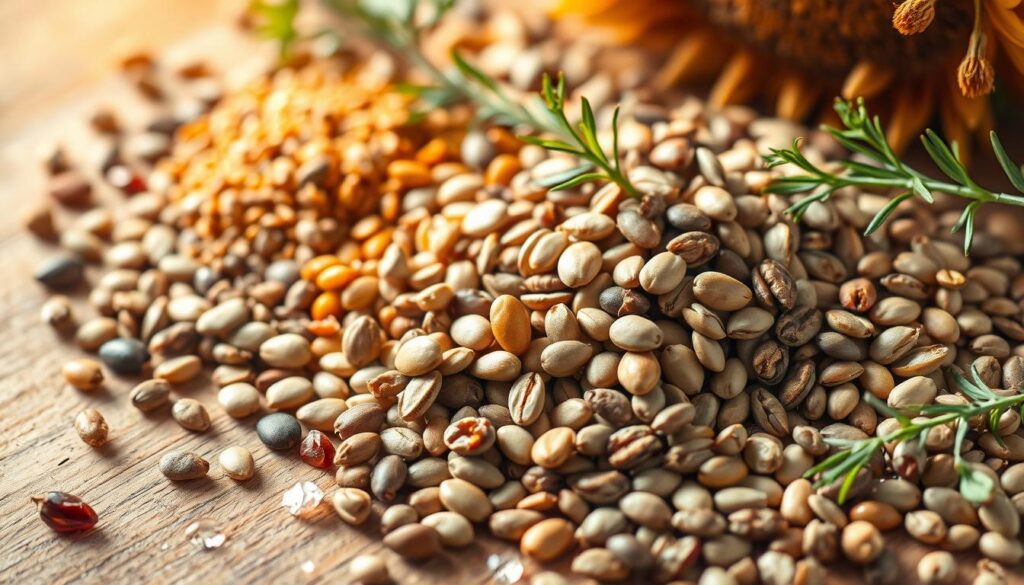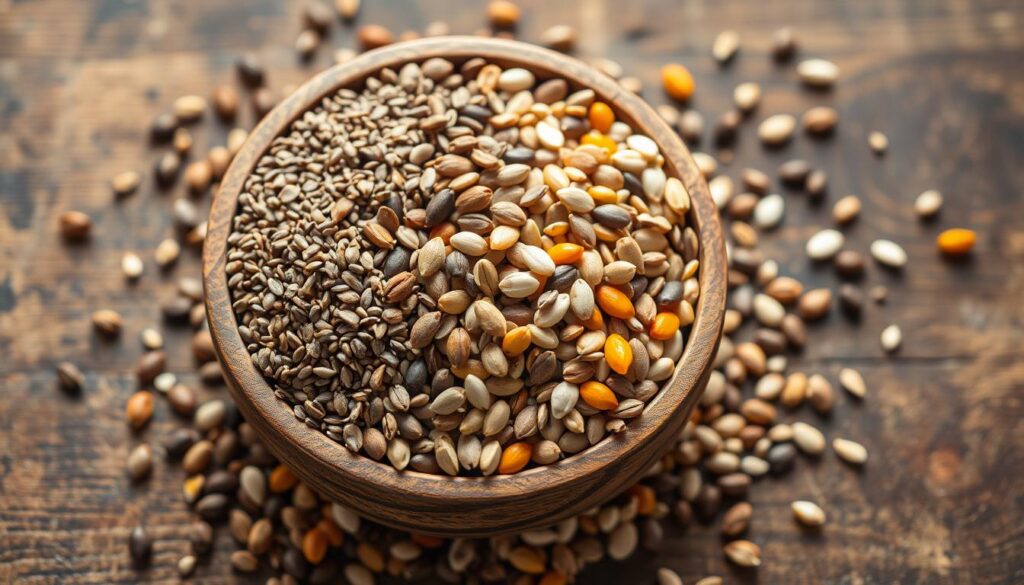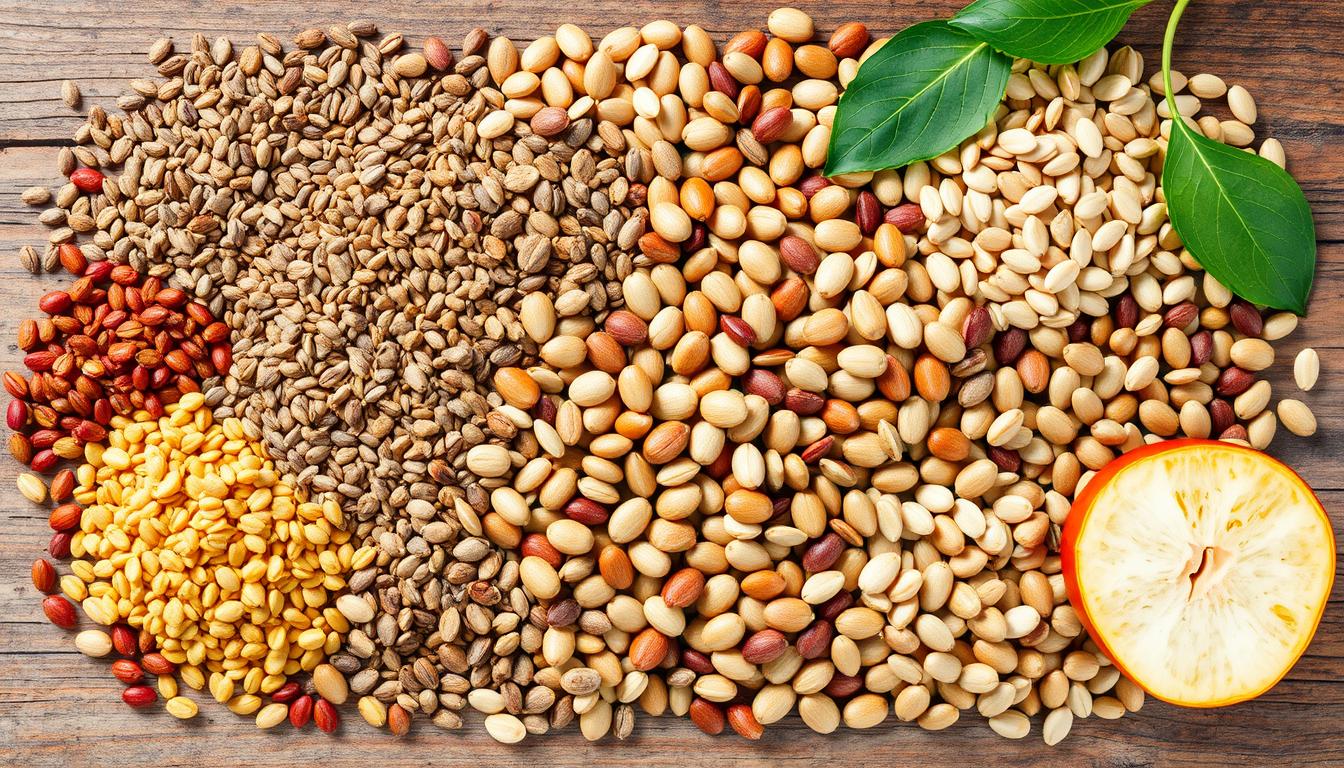As a busy parent, finding healthy snacks for my family was tough. That changed when I found out about seeds. These tiny superfoods have become a key part of our diet. They’ve greatly improved our health.
Seeds have been a vital food for centuries. They’re full of fiber, protein, healthy fats, vitamins, and minerals. Eating seeds helps you get the nutrients you need. It also lowers your risk of heart disease and some cancers.
Table of Contents
Introduction: The Tiny Powerhouses of Nutrition
Adding seeds to your diet is a smart move. They are small but mighty, packed with vitamins, minerals, and healthy fats. Pumpkin seeds and chia seeds are just a few examples. These superfoods are ancient and full of nutritional value, helping your body stay healthy.
Seeds: Ancient Superfoods for Modern Times
Seeds and nuts are loaded with nutrients like proteins, vitamins, and healthy fats. They are a key source of plant-based protein, which is vital for your body’s repair and immune system. Chia seeds and flaxseeds are especially good for your heart and brain thanks to their omega-3 fatty acids.
Why Seeds Deserve a Spot in Your Diet
Eating seeds can help with weight management, heart health, and blood sugar control. They add texture and flavor to meals, making you feel full and energized. This makes them a great addition to any meal, from breakfast to dinner.

| Seed | Nutrient Profile |
|---|---|
| Walnuts | Rich in omega-3 fatty acids, supporting brain development. |
| Brazil Nuts | High in selenium, important for immune function and thyroid health. |
| Almonds | Good source of vitamin E, calcium, and magnesium. |
| Pecans | Contain antioxidants and heart-healthy monounsaturated fats. |
| Pistachios | Provide protein, fiber, and various vitamins and minerals. |
Seedsbenefits: Packed with Essential Nutrients
Nutrient-Dense Profiles of Popular Seeds
Seeds are full of good stuff like antioxidants and protein. Let’s look at some popular seeds and their nutritional benefits:
- Roasted Pumpkin Seeds: One ounce has 163 calories, 8.45g of protein, and 1.84g of fiber. They also have copper, iron, magnesium, and zinc.
- Hemp Seeds: A one-ounce serving has 166 calories, 9.48g of protein, and 1.2g of fiber. They are rich in B vitamins, copper, iron, magnesium, phosphorus, and zinc.
- Chia Seeds: An ounce has 138 calories, 4.86g of protein, and 9.75g of fiber. They are also packed with calcium, iron, magnesium, manganese, phosphorus, selenium, and zinc.
- Sesame Seeds: Two tablespoons have 103.2 calories, 3.18g of protein, and 2.12g of fiber. They are a good source of calcium, copper, iron, magnesium, manganese, selenium, thiamine, and zinc.
- Flaxseeds: Two tablespoons contain 110 calories, 3.76g of protein, and 5.62g of fiber. They also have copper, iron, magnesium, manganese, thiamine, selenium, and zinc.
- Sunflower Seed Kernels: One ounce has 155 calories, 5.47g of protein, and 2.55g of fiber. They are rich in vitamin E, B6, folate, phosphorus, copper, selenium, and zinc.
Antioxidant Properties and Disease Prevention
Seeds are not just nutritious; they also have antioxidants. These can fight off harmful free radicals and reduce inflammation. For example, chia seeds are full of antioxidants. A 2023 study found that eating more hemp seeds can lower inflammation.
Seeds are good for your heart and blood sugar control. They have healthy fats, fiber, protein, and lots of vitamins and minerals. Adding different seeds to your diet can boost your health and well-being.

Supporting Weight Management and Appetite Control
Seeds can be a big help when you’re trying to manage your weight. They are full of seed protein content and seed fiber content. These nutrients are key to helping you reach your weight loss goals. Adding these nutrient-dense foods to your diet can bring many benefits for weight loss.
The Role of Fiber and Protein in Weight Regulation
Fiber and protein in seeds can make a big difference in managing your weight. Chia seeds, for instance, are 35% fiber. This can help you feel full and eat less. The protein in seeds like chia and hemp can also help control your appetite and prevent overeating.
While studies on seeds and weight loss have shown mixed results, they can still be helpful. Adding high-fiber, high-protein seeds to a balanced diet can aid in weight loss. Seeds provide fiber, protein, and healthy fats, which can help keep you full and satisfied for longer.
“Chia seeds are full of fiber, protein, good fats, calcium, manganese, magnesium, phosphorus, and antioxidants according to USDA data.”
An animal study showed that chia seeds helped rats lose more belly fat. A review also found that chia seeds with a low-calorie diet led to significant weight loss.
It’s important to remember that seeds alone are not a magic solution for weight loss. They should be part of a balanced diet and an active lifestyle. This combination is key to managing your weight and staying healthy.
Promoting Heart Health and Lowering Cholesterol
Seeds are not just tasty, but they’re also great for your heart. They have fiber and omega-3 fatty acids that can lower heart disease risk. Soluble fiber in chia and flax seeds can cut down on bad cholesterol. The omega-3 in chia, flax, and hemp seeds also helps reduce heart disease risk.
Studies show that chia seeds can lower triglycerides and oxidative stress, both heart disease risks. Human studies also show that chia seed supplements can lower blood pressure in people with high blood pressure. Pumpkin seeds, with their magnesium, are linked to lower stroke and heart disease death rates.
Seeds’ Impact on Heart Disease Risk Factors
Sunflower seeds are full of omega-6 fatty acids, monounsaturated fats, and antioxidants. They help lower inflammation and cholesterol. Sesame seeds, rich in protein, B vitamins, and lignans, can also reduce oxidative stress and heart disease risk.
| Seed | Heart Health Benefits |
|---|---|
| Chia Seeds | Reduce triglycerides and oxidative stress, lower blood pressure |
| Flax Seeds | Rich in omega-3 fatty acids, help lower cholesterol levels |
| Pumpkin Seeds | High in magnesium, linked to decreased risk of stroke and heart disease |
| Sunflower Seeds | Contain omega-6 fatty acids and antioxidants to lower inflammation and cholesterol |
| Sesame Seeds | Rich in protein, B vitamins, and lignans, reducing oxidative stress and cardiovascular risk |
Adding different seeds to your diet can boost your heart health and lower cholesterol. Their benefits for heart health make them essential for your wellness.
Bolstering Bone Strength and Mineral Density
Your bones are the foundation of your body. Keeping them strong and dense is key for good health. Certain seeds are full of nutrients that help your bones. Let’s look at how seed calcium content, seed magnesium content, and seed phosphorus content boost benefits of seeds for bone health.
Chia, flax, and hemp seeds are rich in calcium, phosphorus, and magnesium. These minerals are crucial for strong bones. Studies show that enough of these minerals lead to higher bone density, which means stronger bones.
Chia seeds also have omega-3 fatty acids that might help bones too. A study on rats showed that chia seeds increased bone mineral content. This suggests that chia seeds’ ALA could help strengthen bones.
| Nutrient | Chia Seeds | Flax Seeds | Hemp Seeds |
|---|---|---|---|
| Calcium (mg/100g) | 631 | 255 | 116 |
| Magnesium (mg/100g) | 335 | 392 | 451 |
| Phosphorus (mg/100g) | 860 | 642 | 1,160 |
Eating these nutrient-rich seeds can support your bones. Add them to salads, smoothies, or baked goods. These small seeds can greatly improve your bone health.
Regulating Blood Sugar and Insulin Sensitivity
Seeds are worth looking into for managing blood sugar and insulin sensitivity. Research shows they may help those with diabetes or prediabetes. This is thanks to their fiber, protein, and other beneficial compounds.
The Potential of Seeds for Diabetes Management
Studies have found that certain seeds can help with blood sugar control. For example, chia seeds may boost insulin sensitivity. This can help keep blood sugar stable after eating.
Adding chia seeds to bread can also reduce blood sugar spikes. Other seeds like pumpkin seeds and nuts have fiber and protein. These can lower blood sugar after meals.
Berries are low in sugar and can improve insulin sensitivity. This helps manage blood sugar levels.
While more research is needed, seeds seem to be a good choice for blood sugar management. Adding them to your diet may support healthy blood sugar and insulin function.
“Over 80% of the world’s population relies on natural compounds for treating various conditions.”
Seeds are packed with nutrients like polyphenols found in grapes and blueberries. They also contain compounds like bitter melon and fenugreek seeds that may help with blood sugar. Using seeds can be a natural way to manage blood sugar and insulin sensitivity.
Conclusion: Versatile and Easy Ways to Incorporate Seeds
Seeds are super versatile and simple to add to your meals. You can eat them raw, soak them in juice, or mix them into oatmeal, smoothies, baked goods, and salads. They’re also great as a thickener in sauces or an egg substitute in recipes. Their neutral taste makes them perfect for both sweet and savory dishes.
Seeds are packed with nutrients and offer many health benefits. Adding more how to add seeds to your diet, ways to eat seeds, and using seeds in recipes can greatly improve your nutrition and wellness. Chia, flax, pumpkin, and sunflower seeds are all great options to add to your daily meals.
Try sprinkling them on yogurt, blending into shakes, or baking into muffins. Seeds are a convenient and versatile way to make your meals healthier. Let these tiny powerhouses boost your health and well-being.
